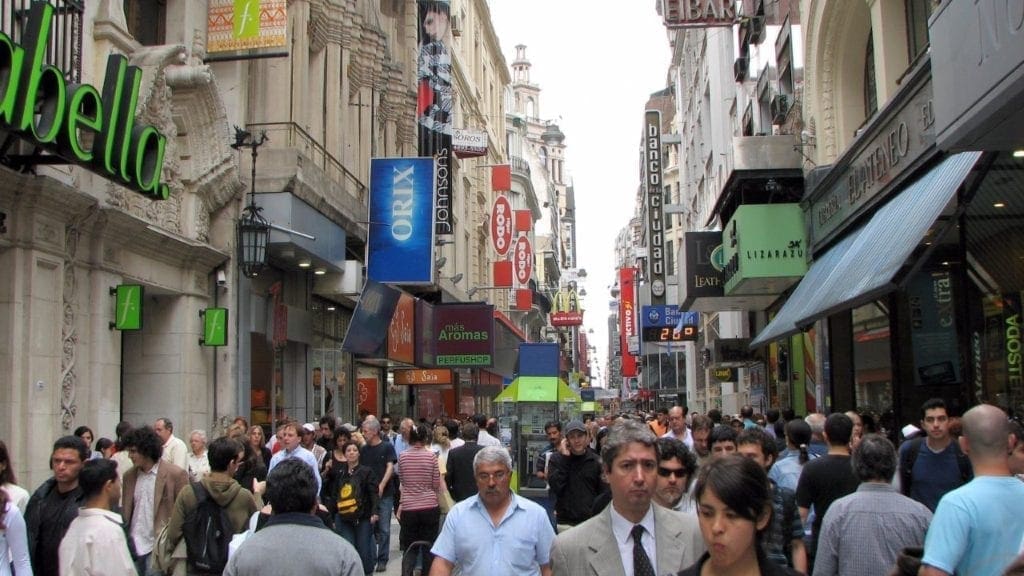Like many long-stay tourists, I came to Buenos Aires to learn Spanish and take my time to travel and discover Argentina. Since I do consider myself as temporarily living in this great city, I’ve had to adapt to a different lifestyle that is typical to locals but foreign to me. It is definitely a refreshing and exciting experience when you realize things around you do not work the way you’re used to; which makes you see or even value them differently. These are some of the things that I have learned and pick up along the way as I get accustomed to my new life in Buenos Aires.
1) Eat everything with ham and cheese. If the word ‘napolitana‘ is part of the name of the dish, it means ham and cheese is added on top! Like pizza napolitana, milanesa napolitana, hamburgesa napolitana etc.
2) Keep your head down, eyes on the pavement when walking, looking out for loose tiles or dog poops. Especially look out for loose tiles when it has been raining, one wrong step and it’ll be a SPLASH!
3) Don’t give out your change or small bills easily! Change is relatively hard to come by and everyone seems to have the same problem. If you don’t have anything smaller than a AR$1000 bill and you want to buy something less than AR$200, you might get an annoyed look and rejection for your business.
4) Get used to eating dinner late like 9:30 pm or later, which is the normal dinner time for Argentines. If you aren’t able to adjust to it, that will significantly limit your restaurant options since most of them aren’t open until at least 8:30 pm. My tips would be either have a big late lunch or have a small snack around 6/7pm.
5) Learn how to take the bus, which are called ‘colectivos‘ here. I came from a city where driving everywhere is more of the norm. Surely I took the subway once in a while, but the bus, not so much. Buenos Aires has a very extensive and convenient bus system. They run pretty much 24/7 and it’s super economical. Once you know how to use the Guia T or online site like Mapa Buenos Aires, to figure out which bus to take, you can go to any corner of the city with no problem!
6) Take your time to eat, no, ENJOY a meal. If you decide to sit down for a meal, expect it to last at least an hour. Some people might see it as the result of slow service but to me, it’s just the relaxed pace of the culture here. The waiter never rushes you to make a decision, to take your order or to charge you and get you out the door. It might take them 15+ minutes to return with ‘la cuenta‘ after ‘Check please!’, that just gives me more time to sip my after-meal coffee.
7) Don’t assume cars will yield to pedestrians. Before you step onto any streets to cross, even if it’s an one-way, with lights or no lights, stop and look both ways first. I have learned very early on in my stay that drivers here aren’t keen on using the signals or following the rules. Let’s say I had a few close calls where a non-signalling car made a fast turn onto the street I was trying to cross.
8 ) Fashionably late. ‘Being on time’ doesn’t really exist here, and the concept of ‘time’ is used quite loosely. If something is ready to be picked up ‘por la tarde‘ (in the afternoon), that could mean anytime between 3pm – 8pm or even the following day. It’s wise to call ahead or give it a good few hours of buffer time so it’s less likely you’ll be disappointed and have to make the trip again. This same idea applies to all other situations.
9) Call to find out information. I’m nervous talking on the phone in Spanish but after many inquiry emails were unanswered or answered a few days too late, I have decided to pick up the phone. It might take some time fumbling with words and a few ‘¿Podés repetir por favor?‘ (Can you repeat please?) but if you want answers to your questions, making the phone call is the way to go.
10) Don’t get too upset about how not ‘green’ the city is. The attitude towards being environmental friendly is still in its early stage. Recycle opportunity is limited. Take out food is commonly served in paper/plastic container, covered by a plastic sheet or tightly wrapped in saran wrap, then top with more paper wrapping all around and finally in a plastic bag! I am seeing progression though, like since October, a new law has been in effect where all big supermarkets are only allowed to use biodegradable plastic bags and are charging extra for them. So remember to bring your own shopping bags when you go do your groceries shopping!
For more info visit us at Viamonte 1516, Buenos Aires, Argentina
Interested in Learning Spanish Online ? Start Today!
Looking for Diplomaturas ?
Written by: Alex Cotonat




